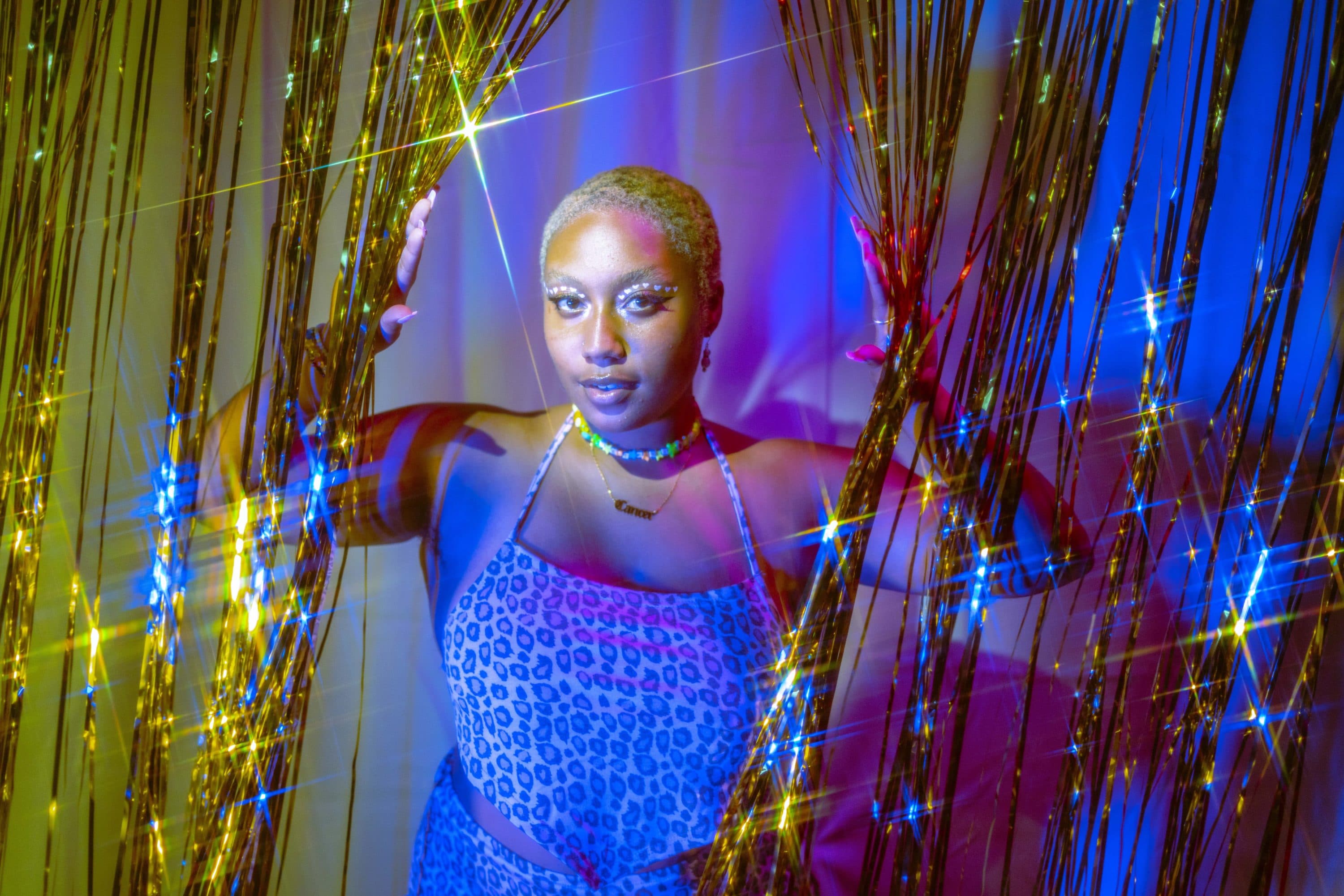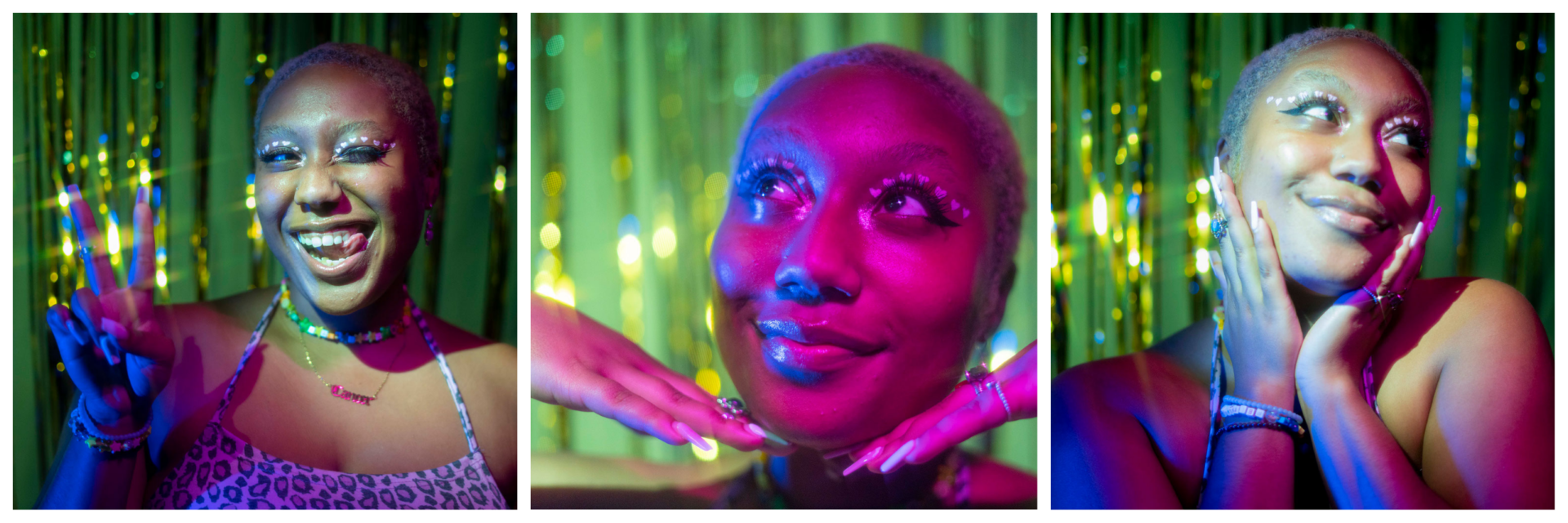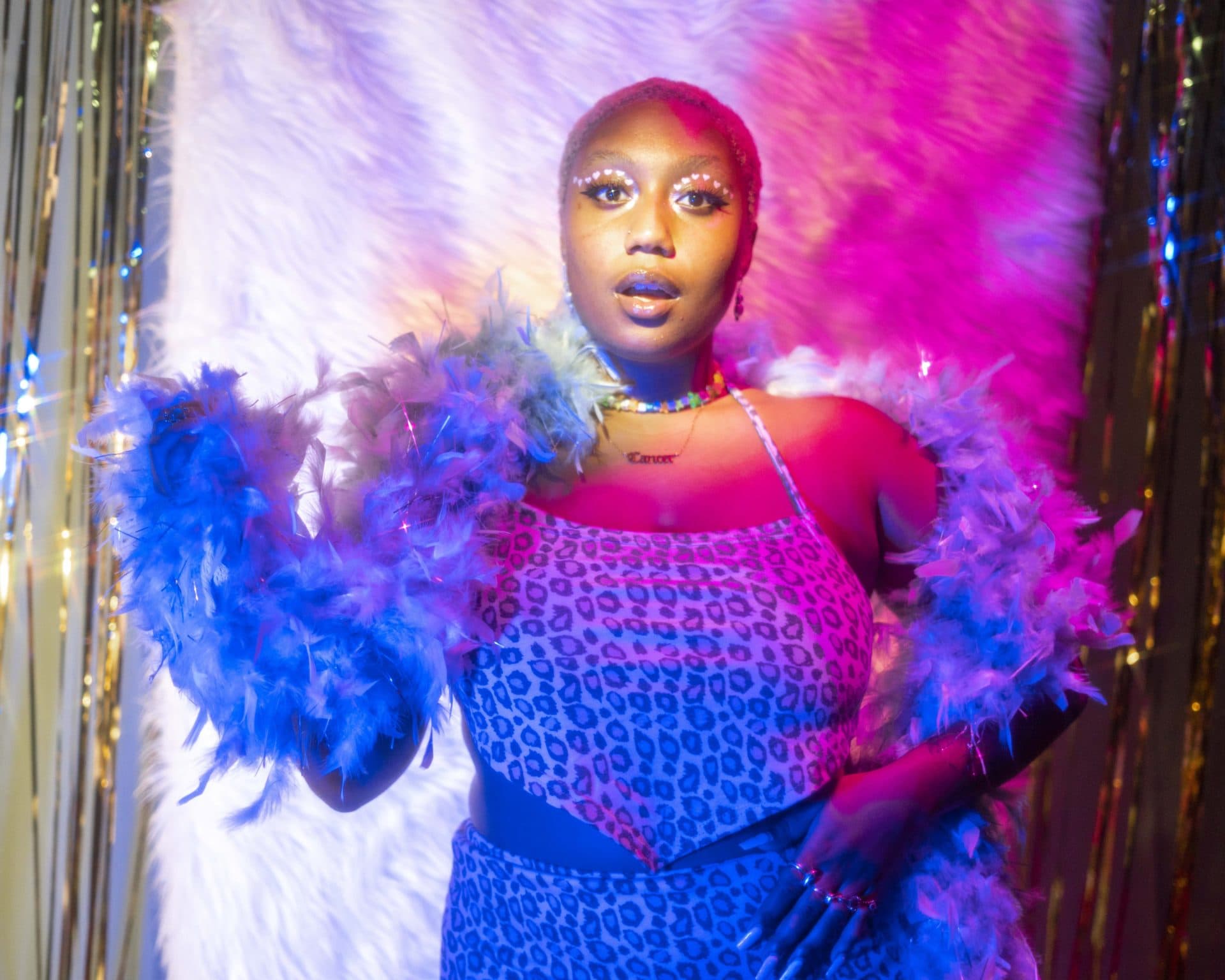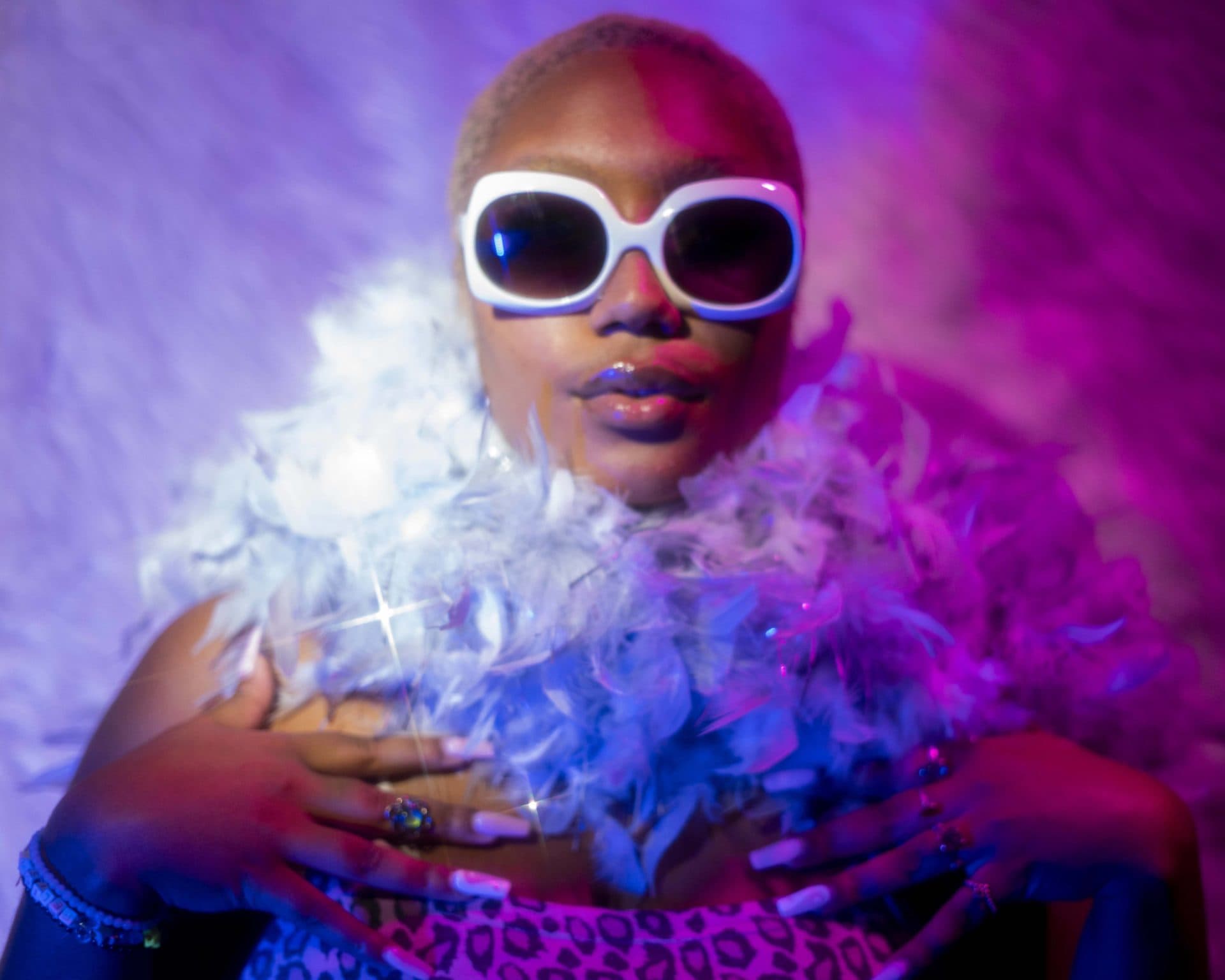
Dorchester musician Eph See channels teen angst into buoyant pop
Eph See stood in a recording studio at Northeastern University, practicing a passage on electric guitar, undeterred by inch-long, powder-puff-pink acrylic nails. The 22-year-old singer and songwriter was working out a song idea inspired by early 2000s pop punk. Eph had already laid down the main track, an ascending chord progression hoarse with distortion. Now they just had to execute a short lick — more of a flourish, really — that punctuated that triumphant final chord. On the other side of the glass, Eph’s friend Cheryl Tugade waited for the musician's signal. Then, she hit “record.”
Back in the engineering booth, Eph sat down at the console and listened back. “Oh, that’s sick,” they declared with a chuckle. Still, they had noticed a small imperfection — the first note of the lick landed a split second late. “I’m just going to nudge that over,” Eph said, highlighting the offending section with the cursor. After a series of minuscule adjustments, the track was deemed satisfactory. Then, a stroke of inspiration: “I think I’m going to harmonize it with the guitar.” Eph hurried back into the recording booth, and in two takes laid down another track; now, twin guitars rose in parallel thirds. Tugade smiled appreciatively. “I can hear the punk.”
So far, the song had only one lyric: “There’s about 80,000 causes to care about, but nothin’s getting done” — a line inspired by “doomscrolling on Twitter,” in Eph’s words. It was set to an earworm of a melody that climbed and fell in jagged leaps like the graph on a heart monitor, rising in urgency (and pitch) before flatlining with an air of resignation. Eph sang it plainly, with a slight tremolo on the word “care.” After listening back to the first take, they decided to double the vocals. (“Because doubles are punk. You can quote me on that.”) This, too, was accomplished in a single take. Now two Ephs sang in unison, a disaffected chorus of two.
The session had topped 40 minutes, and there wasn’t any more song to record, but it seemed possible that Eph could go on like this for hours, tinkering endlessly with the same 25-second snippet of music. If this was work, it looked a lot like play.

Perhaps this is the secret to Eph See’s paradoxically buoyant music, which surrounds melancholy sentiments with bubblegum melodies and bright production — a playful environment in which to explore the fallout from teenage angst. Their 2021 debut EP, "g*rlhood," captures the romance of adolescence from the perspective of someone (slightly) older and (regretfully) wiser. “I recall when there was a time I/ Could paint a fantasy behind the lids of my eyes,” Eph sings on "daydream princess," a frothy bop about losing the ability to dream. “I remember, but it’s out of sight, out of mind.”
Eph See, whose given name is Felisha Cabral (“Eph See” is a phonetic spelling of their initials, “F.C.”), grew up in Dorchester to Cape Verdean parents. The foundational music of Eph’s childhood came from an older sister and a young aunt. “[They] would burn CDs of emo or pop punk or the diva pop they listened to,” Eph said — JoJo, Britney Spears, My Chemical Romance, the Spice Girls. Eph can still sing from memory the first song they ever wrote, at age 10, which bears the unmistakable influence of early aughts R&B — as well as a preternatural grasp of pop music structure.
Advertisement
Eph learned to sing in the school choir and the high school drama club, snagging coveted roles, like Mimi in “Rent” and the Leading Player in “Pippin.” The “Pippin” part was a dream role, but “the costume was, like — I was in borderline lingerie,” Eph said. As a teen, they stood out from their peers, for myriad reasons: they had a mature voice, a developed body, and were one of the few Black students at their elite private high school. “I also wanted so badly to be the ingenue,” Eph said. “But because I had a powerhouse voice and, you know, looked the way I did … I think that, either consciously or subconsciously, made people see me as the mother and crone, more so than the maiden.”
It was only later that the singer felt they had been typecast. That realization provided the seeds for “the pill,” the first song on “g*rlhood” and its most bluntly arresting. “I was a theater kid but I just played strippers and drama queens/ And I never talked about how it hurt but now I’m coming clean,” Eph sings in the opening verse, summing up a layered experience with bracing economy.

Other songs on “g*rlhood” speak to widely relatable adolescent experiences. On “did i?,” Eph wonders if a teenage crush was even a crush at all — or merely a manifestation of a desire to be loved, singing, “Did I, did I really want it?/ Or feel like I had to have it?/ Why did I really want it at all?” But “did i?” thrums with a more complex and difficult longing. “Going to a predominantly white school, it was a little taboo to, like, have a crush on or express interest in or to date the Black kids,” Eph said. “I was thinking about how much I wanted a boyfriend when I was, like, 13, just to kind of have this confirmation that, yes, it's possible for me to be wanted.”
The melody of “did i?” arrived serendipitously. “I started writing the song after I heard a bird outside going” — Eph puckered their lips and whistled a sing-songy, two-note phrase. It became the blueprint for the track’s lilting chorus, made sweet and ethereal by echoing backing vocals and, if you listen closely, the sound of chimes.
Those chimes are courtesy of the producer Lucas Sim, or LEXIM, as he is known professionally. “I would say ‘natural,’ honestly, [is] the best single way to describe [Eph's] musicianship,” said Sim. “They know what they’re hearing in their head and they don’t compromise their own style.”
Sim, who is a student at NYU, met Eph during the early days of the pandemic through the college social networking app Quadio. The two were paired together randomly in a Zoom songwriting club, and immediately clicked. Soon, they were setting up their own Zoom songwriting sessions, and the outlines of “g*rlhood” began to take shape.

At that point, Eph had only released a few self-produced songs. Sim saw his role primarily as one of support, “just kind of getting it from a demo to a finished song.” His production on “g*rlhood” is lighthearted and unpretentious, adding texture and polish to Eph’s hyper-melodic reveries.
While “g*rlhood” is a reckoning with adolescence, the asterisk in the title gestures to a more recent transformation — Eph's adoption of they/them pronouns and a nonbinary identity, in September of 2021. “It was a full moon eclipse in Sagittarius,” they recalled, laughing. “I was just sitting in front of the mirror and looking at myself. And I was introducing myself to myself. And I just said, ‘Hi. I'm Eph See, and my pronouns are she/they.’ And I was just kind of saying that to myself, and it felt more and more comfortable. And I felt all this pressure to be ‘girl’ just kind of melt away.”
Now Eph stands at the threshold of a new landscape. They have only one more semester to complete at Northeastern, where they are majoring in music industry and communications with a minor in music recording. They've been thinking about which city they might move to after graduation — New York? Nashville? — and working on new music. “The singles that I’m sitting on are a lot more fun,” they said. Though, to be truthful, the topics are characteristically bummer — one demo Eph shared with me is about getting stood up at the mall, possibly the most tragic scenario imaginable for a teenager. Yet the singer sounds joyful, voice buoyed by cascading backing vocals.
“I feel like I've shed a lot of layers and a lot of the masks that I was wearing,” Eph said. “Now I’m letting myself be really curious and explorative again, and having less fear."
This article was originally published on August 25, 2022.
